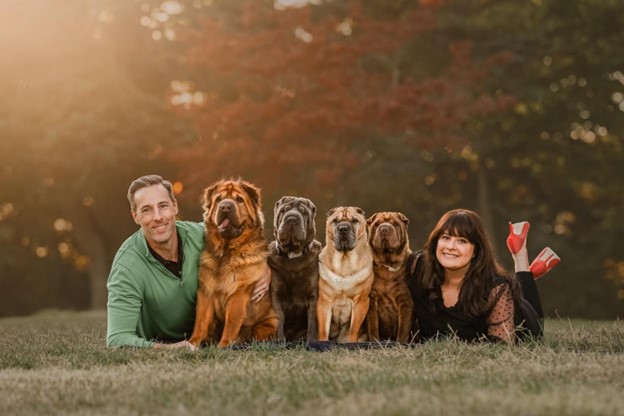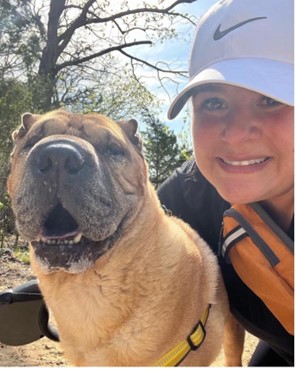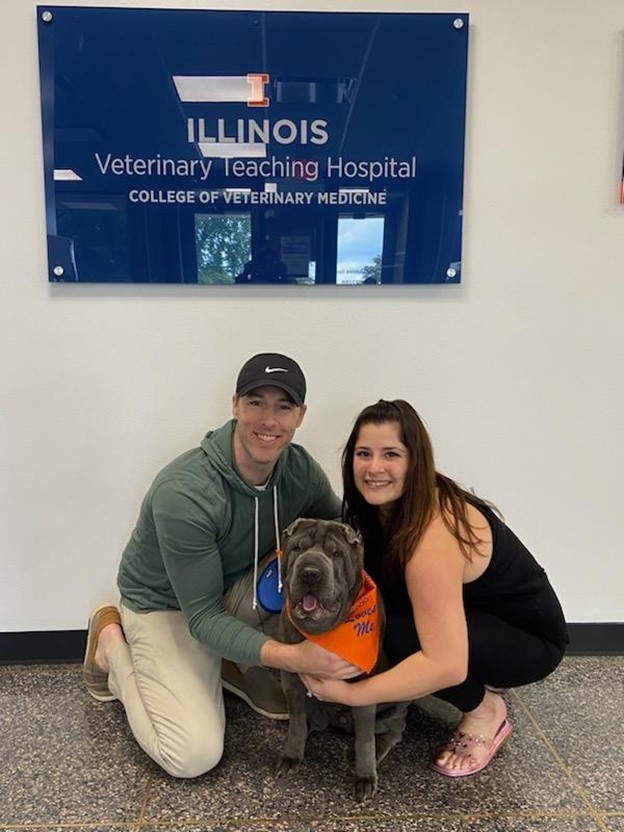Contents
Hello! Who are you?
Hello there! My name is Erika Sinner, and I proudly call St. Louis, Missouri, my home. Nestled in the Midwest, this vibrant city is where I’ve laid the foundation for my career and personal passions.
I am the founder and CEO of Directorie, a company committed to facilitating the journey of life science organizations in delivering crucial medications to those in need.
With a career spanning nearly two decades in the pharmaceutical industry, my focus has been on propelling teams toward success while advocating for compassionate leadership.
Apart from my role as a CEO, I cherish my identity as a devoted wife and a passionate advocate for animals. My husband and I made a conscious choice not to have children. Instead, we had four wrinkly fur kids: Kingston, Mishka, Edmond, and Teddygrams. They are members of our family, bringing us joy for eight wonderful years.
Our family moments included vacations to Barkwells, memorable Christmases with them tearing open their presents, and an online Instagram community of 40,000 who followed our adventures. Sadly, we recently lost Kingston last summer, which was a profoundly challenging experience.
When it comes to happiness, I consider myself a glass-half-full enthusiast, always highly caffeinated with an unwavering belief in the power of positivity. Known among my friends and family as the go-to person for spreading cheer, I thrive on uplifting others and embracing a dreamer’s spirit.
I think this comes from my humble beginnings and challenging childhood which has led me to find gratitude in every moment. Maybe a survival mechanism that I cherish now.

💡 By the way: Do you find it hard to be happy and in control of your life? It may not be your fault. To help you feel better, we’ve condensed the information of 100’s of articles into a 10-step mental health cheat sheet to help you be more in control. 👇
What is your struggle and when did it start?
My mental health struggle happened following the sudden loss of my dog, Kingston, during the summer of 2023. We lost Kingston to Hemangiosarcoma in just one week, and the grief was unlike anything I had ever experienced.
Resisting this emotional whirlwind, I clung to my routine, intense workouts, and work to keep the pain at bay. But after seventeen days, my body refused to comply.
On a morning coming home from yoga having vomited from the pain I was suppressing, the weight of shame settled upon me. Shame it hurt this much. I feared that my team would perceive me as weak, questioning why I couldn’t continue as usual.
For our family, our story got worse. Only 21 days after the nightmare began, we were faced with another blow. Edmond needed X-rays on his back legs for suspected arthritis.
During this appointment, it was discovered he had an aggressive cancerous tumor on his tongue. We navigated a summer involving radiation, immunotherapy, surgeries, and watching him suffer without being able to explain what was happening.

How did this struggle make you feel at your worst moments?
In the darkness of my mind, as I lay down to sleep on the night of June 4, 2023, a haunting thought crossed my mind: Maybe I just won’t wake up tomorrow.
The idea of slipping away peacefully in my sleep felt like a gift, a release from the overwhelming weight of my emotions. The thought of never opening my eyes again seemed like a merciful escape.
I mustered the courage to schedule an appointment with my doctor the very next day. There was a single opening available at 2 pm, and I took it. The day I sat in that exam room, a mixture of grief and shame was coursing through my veins, as I prepared to reveal the extent of my struggle, and how deeply impacted I was by the loss of my beloved dog, Kingston.
The internet Google gods were not there for me. The advice to work out, try to sleep, listen to music, stay in a routine…none of it was helping.
I sat there thinking about how I am a CEO and the proud founder of a thriving company; I’m in a deeply committed loving relationship; and I have ambitious dreams still to be realized. Yes, I was hurting this badly and not able to function. How did I get all the way here?
The struggle was not just the grief; it was the emotional avalanche that followed that engulfed me in darkness. I found myself drowning emotionally, grappling with feelings I hadn’t experienced in such intensity before.
Alongside profound sadness, I grappled with the weight of my responsibilities as a CEO. There was this nagging fear that my team might perceive my emotional vulnerability as a sign of weakness in leadership. It was a battle between acknowledging the necessity of prioritizing my brain health and the societal pressure to keep a strong front.
In today’s society, we’re not entirely comfortable with grief or sharing our emotions. There’s an unspoken pressure to move past sorrow, aiming for a quick return to normalcy.
When a human family member passes, we do have some established rituals to honor their memory. Obituaries, ceremonies, funerals, sending flowers, and donating to charities—all recognized ways to pay tribute to a person’s life. However, the scenario changes when it involves our beloved pets, leaving many of us to navigate this journey alone.
Even within my own company, where I have always had a focus not only on pets but also on prioritizing human beings first; knowing we are all so much more than our job titles and what we do for a living. Yet, there were still misunderstandings on how to support me and my emotions upon my return.
Awkward meetings and, in some cases, a collective silence pretending nothing had happened. I learned quickly after speaking with some of my team that no one really knows what to do when someone loses a pet.

👉 Share your story: Help thousands of people around the world by sharing your own story. We would love to publish your interview and have a positive impact on the world together. Learn more here.
Was there a moment when you started to turn things around?
Recognizing the profound impact on my mental state and seeing my healthcare provider was a moment of change. It was a pivotal moment when I realized the importance of treating mental health as seriously as physical well-being.
Just as we prioritize maintaining physical health, acknowledging our brain’s need for care and attention is equally crucial. I would say leaving that appointment I felt 30% lifted in that I was heard and validated in that what I was experiencing wasn’t “all in my head” but real pain and something medically to pay attention to.
This appointment also led to finding a therapist. While I had been to therapy in the past, this time it was different. I was not only grieving but I was also traumatized by the euthanasia process and experienced intrusive thoughts and flashbacks of how unsettled he was and the last jerk he had when he received the final injection. I kept going back to that day.
The specific moment would flash in my mind and knock the wind out of me. There were immediate tears, and the feeling of not being able to breathe, it even happened once while driving and I swerved. I could not control when these thoughts would hit me, and I knew this more than only the grief.
I tried to contain the memory using the container exercise, a technique I had learned in talk therapy, but it was not helping. That is when my world opened to a therapist who practiced Eye Movement Desensitization and Reprocessing (EMDR) therapy, a technique that focuses on processing traumatic memories by moving the eyes in specific patterns.
When people talk about the ‘mind’ and ‘brain,’ it might seem like they’re the same, but they’re actually quite different. Your brain is like the control center of your body, but your mind? That’s where things get really interesting. It’s this whole collection of thoughts, memories, beliefs, and experiences that basically make you who you are.
Normally, your brain does this fantastic job of storing memories smoothly and connecting them to other stuff you remember. But when things get tough or unsettling, like during upsetting events, that connection can get messed up. It’s like your brain takes a timeout, and suddenly, what you’re feeling or experiencing doesn’t sync up with what your brain’s storing in your memory.
EMDR helps “reassign” the correct emotions to the memory you are having. One session where I processed a flashback was a game-changer. That memory transformed from this haunting thing to a memory where I realized Kingston, was okay now—no more pain, completely safe.
I truly believe EMDR brought healing I wouldn’t have reached in just talk therapy, maybe not even in months or years. This I think got me another 20%, but the healing is still coming in my continuation of therapy to process my grief.
What steps did you take to overcome your struggle?
Healthcare Support: See your doctor. I still see my therapist weekly. It’s opened up more conversations beyond Kingston that have changed me as a human being and how I show up in the world. I am so grateful to have started and wouldn’t have on my own.
Structure: I feel lucky to own my company and be able to take the time off. My experience was the moment that mattered, highlighting the necessity to validate the need for time off work, allowing space for grieving, and recognizing that grief doesn’t adhere to a fixed timeline.
I realized that if I, in my position, could experience this level of shame, it became clear others must be encountering similar emotions, potentially with even greater intensity, especially if their work circumstances are less flexible. I now feel a responsibility to advocate for pet bereavement to be added to organizational policies.
Even if not at parody to immediate family, a single day acknowledges from the organizations this is real and it matters. Managers and bosses too are also forced to have compassion that their employees are taking time off for bereavement, not PTO, and coming back refreshed. I created resources on my website to help support conversations with Human Resource departments on why this matters.
Community: I feel lucky for our family and friends who know how much our furry kids mean to us as well as the social media following our kids Instagram has built.
I had people commenting, messaging, and sending love at all hours of the night with hundreds of messages. I’m very aware this is not the norm, but what it helped me realize that I want to say to everyone is that we need community. This requires us to be vulnerable.
We’re all comfortable with sharing cute photos and stories about our pets, but do we feel equally comfortable sharing the depth of our grief when we lose them? My personal experience challenged me to reevaluate my own understanding and openness to discussing the hard things too.
It doesn’t always have to be sunshine and rainbows. It has led to deeper connections with those I care about and even those I’ve never met in person. The beautiful thing about pet grief is when we lose a human family member and talk about it, our response is not to then say, “Oh I lost my family member too and this is what I did”.
We hold space for someone. We have them share memories, but with dogs when I’ve opened up and others have shared their stories it gives me an opportunity to feel seen, heard, and understood in a way I couldn’t have ever imagined.
It’s truly within seconds you feel the very human connection. These animals even in passing help us connect more on a human level.
If you could give a single piece of advice to someone else that struggles, what would that be?
Honor your feelings. Throughout my life, I have been learning how to find importance in the world. To truly believe in my own self-worth without the constant need for validation.
To feel that I belong here simply because I am me, and to understand that I matter without any expectations or conditions. Maybe for me, it was my dad choosing the “other woman” and the life he was living in parallel to ours when I was seven, or my mom’s decision to uproot us from Texas to a small Midwestern Missouri town, with little knowledge of the place and struggling to learn English.
Perhaps it was the failure of my marriage to my high school sweetheart or the brief second marriage that led to a cross-country move and a return to Missouri.
These experiences made me realize that this is MY life, and every decision I make is shaped by my own unique circumstances and thoughts on how to navigate.
We all do our best with the information available to us at any given time and follow our instincts. In light of this, I’ve learned the importance of taking ownership of my feelings and actions, embracing them as part of my journey, and continuing to move forward.
Most could label my life a success: I’m a Mexican-American woman who founded and runs a multimillion-dollar company, lives in a beautiful home, married her best friend, and decided kids were not for her…instead, has four Shar Pei; now three.
Yet, it has taken until the age of 38 for me to begin filling the void inside myself, to accept that I matter just as I am. That means I’m important enough to honor my feelings. My first thought is how could it have taken this long? My second was, that it can’t just be me who feels this way.
If you’re reading this now, know you are not alone. What you are feeling someone else is too and they may be in your current family and friendship circle struggling alone.
Losing Kingston illuminated a responsibility in this mission. First to bring awareness to the impact of losing a pet can have, but also to lead by example and being vulnerable in openly discussing my emotional journey. It wasn’t solely about healing from loss but also demonstrating to my team the significance of mental health awareness and self-care.
It required strength to seek help and openly address emotional struggles, and that, I believe, set a powerful example for my team and our company culture. We can’t normalize something if we don’t talk about it.
Where can we go to learn more about you?
To follow my journey please sign up for updates on my website. I get notifications for every sign up and it means a lot. If you plan to advocate for pets to be added to your organization, I would love to hear from you on how it went, anything else I can provide to support, and especially success stories.
💡 By the way: If you want to start feeling better and more productive, I’ve condensed the information of 100’s of our articles into a 10-step mental health cheat sheet here. 👇
This Cheat Sheet Will Help You Be Happier and More Productive
Thrive under stress and crush your goals with these 10 unique tips for your mental health.
Want more interviews?
Continue reading our inspiring case studies and learn how to overcome mental health struggles in a positive way!
Want to help others with your story? We would love to publish your interview and have a positive impact on the world together. Learn more here.



